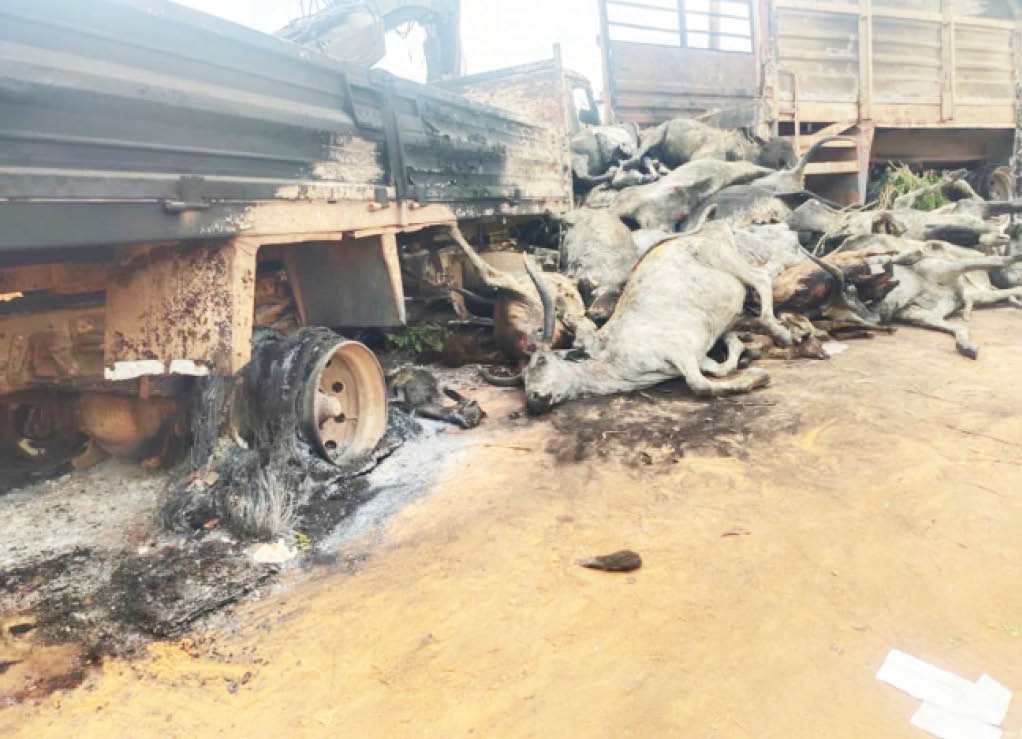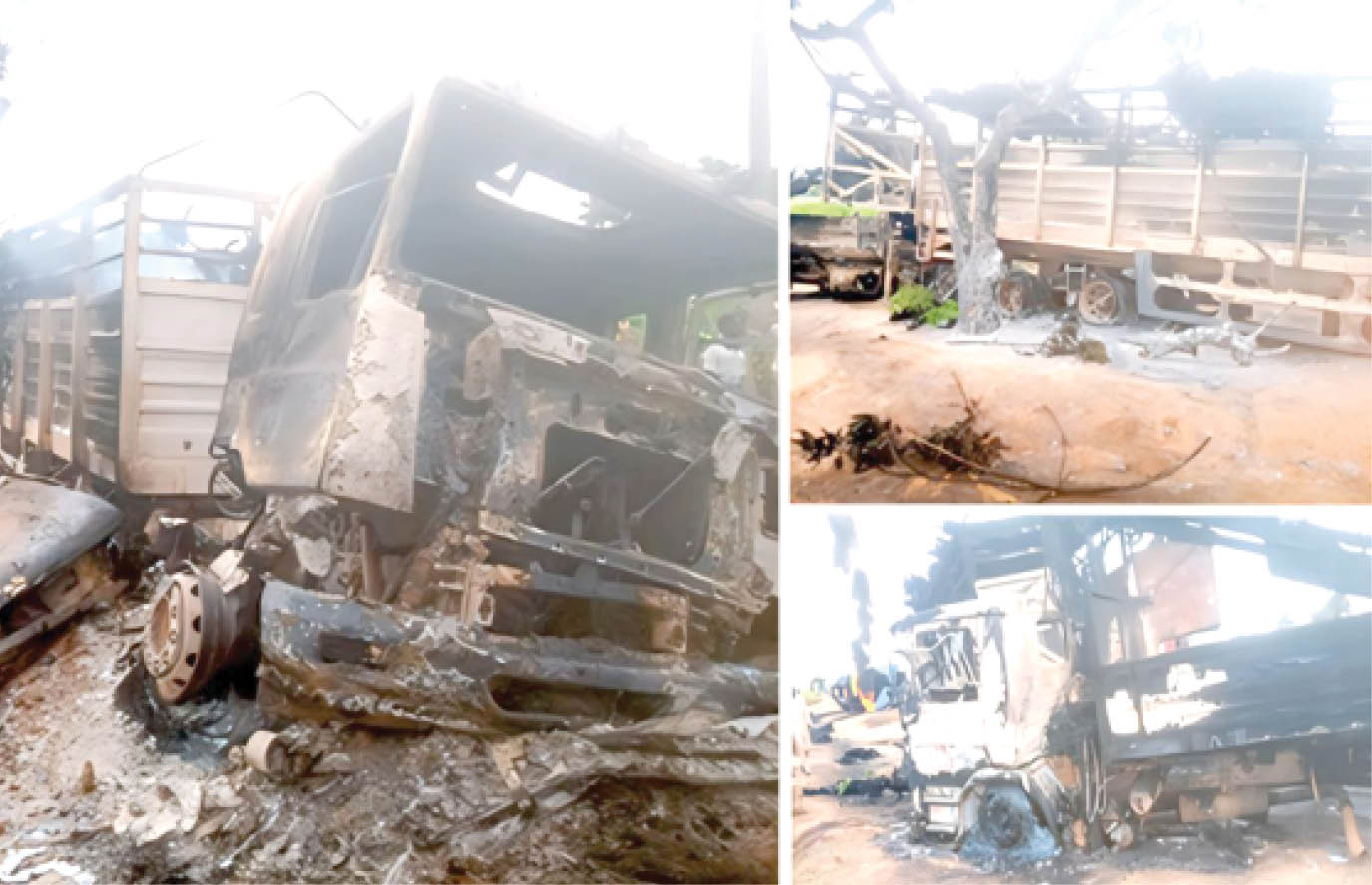48 people, 50 cows killed in Niger road accident
Forty-eight people have lost their lives as a result of a petrol tanker explosion that occurred along Bida-Agaie-Lapai- Road in Niger State. Alhaji Abdullah- Baba-Arah, Director-General, Niger Emergency Management Agency (NEMA), disclosed this in a statement in Minna on Sunday. He said the agency received a report of a deadly tanker explosion that occurred on […]

cow killed in accident in niger state, yesterday
Forty-eight people have lost their lives as a result of a petrol tanker explosion that occurred along Bida-Agaie-Lapai- Road in Niger State.
Alhaji Abdullah- Baba-Arah, Director-General, Niger Emergency Management Agency (NEMA), disclosed this in a statement in Minna on Sunday.
He said the agency received a report of a deadly tanker explosion that occurred on Sunday at about 12:30 am along Bida-Agaie-Lapai highway.
According to him, the scene of the disaster is two kilometres away from Dendo community in Agaie Local government Area.
- Real reason Ajuri Ngelale stepped down as Tinubu’s spokesman
- We’ve not been paid 30 months allowances, border security personnel cry out
He said the incident occurred when a petrol tanker loaded with petrol (PMS) collided with a trailer truck loaded with travellers and cattle from Wudil in Kano State en route Lagos.
Baba-Arah said two other vehicles, a crane truck and a pickup van were also involved in the multiple incidents.
The director-general said the agency’s ‘Rapid Respond Team (RRT) and other ‘Local Emergency Management Committees (LGEMCs)’ were still at the scene of the incident.
He said that they were conducting search and rescue operations as more corpses were still trapped inside the ill-fated trucks.

Witnesses told the Daily Trust that the crash was due to the deplorable state of the road and that the tanker fell and exploded, leaving the victims and over 50 cows burnt beyond recognition.
The Niger State Sector Commander of the Federal Road Safety Corps (FRSC), Kumar Tsukwam, who confirmed the crash to our correspondent yesterday, said the accident was a result of speed limit violation and loss of control.
He said in his account that 37 of the 55 people, all males, that were involved, died and that 18 others were injured.
He said, “The tanker from Lagos on transit to Kano loaded with fuel was on top speed, lost control, fell down and was engulfed with fire. Another trailer that conveyed cows and humans and two other vehicles were affected.”
A resident of Agaie, Abubakar Agaie, who said he attended the burial of the victims, said 45 corpses were buried in Man-Woro village.
Another source, Yahaya Mohammed, said, “The tanker fell and caught fire. The drivers of the other two vehicles, a passenger vehicle and a trailer loaded with goods and human beings, saw the fire, wanted to pass and fell victims.”
Another witness said, “Two other vehicles were coming to the Agaie market with goods and got involved. In total, four vehicles were burnt and the people involved were more than 30, but we don’t know the number of the cows involved.”
In a statement by Bologi Ibrahim, the Chief Press Secretary to Governor Mohammed Umaru Bago, described the accident as painful.
He said that the governor called for calm while enjoining road users to always be cautious and abide by road traffic regulations to safeguard lives and property.
The governor prayed that Allah repose the souls of the departed and grant quick recovery to the injured.
Meanwhile, on May 24, the Major Energy Marketers Association of Nigeria (MEMAN) launched a stakeholders’ initiative involving the Depot and Petroleum Products Marketers Association of Nigeria (DAPPMAN), the Nigerian Midstream and Downstream Petroleum Regulatory Authority (NMDPRA), the Nigerian Association of Road Transport Owners (NARTO) and other key players to identify and resolve factors responsible for petroleum tanker crashes and explosions.
MENAN’s Executive Secretary, Clement Isong, said the analyses of several petroleum tanker-related crashes over the past four months in 2024 showed that they were caused by factors such as deplorable road infrastructure, inexperienced drivers and lack of proper truck maintenance.
He said, “Issues included drivers’ mental alertness and attitude. Some trucks were fully loaded, up to 66,000 litres, far exceeding safe limits. Inadequate maintenance practices led to mechanical (brake) failures.”
